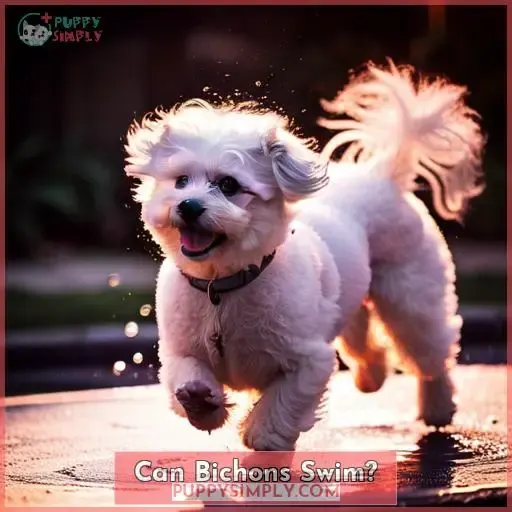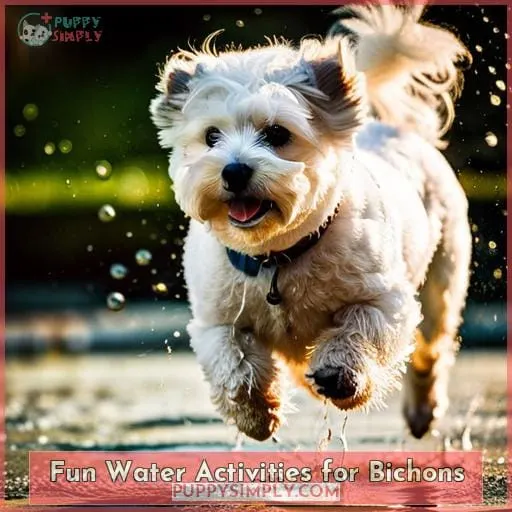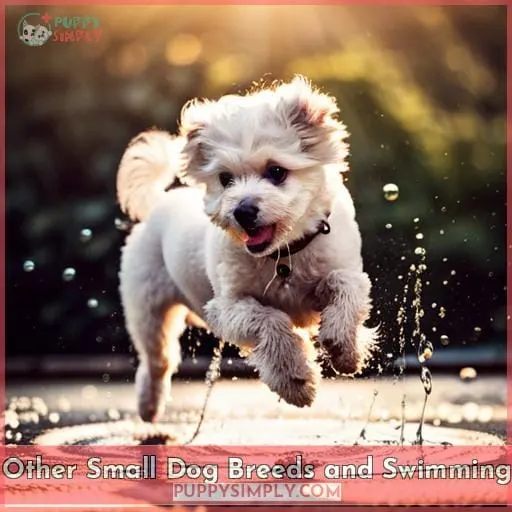This site is supported by our readers. We may earn a commission, at no cost to you, if you purchase through links.

While every dog is different, most Bichons love water!
In this article, we’ll explore:
- Why your Bichon might enjoy swimming and water play
- How you can help them overcome any fears they may have
- Essential safety tips to keep in mind when your Bichon is near water
We’ll also provide tips for turning your Bichon into a water lover and fun water activities you can enjoy together.
Table Of Contents
- Key Takeaways
- Can Bichons Swim?
- Why Teach Your Bichon to Swim
- How to Get Your Bichon Comfortable With Water
- Essential Safety Tips for Bichon Swimming
- Ideal Swimming Frequency and Duration
- Do Bichons Like Water Naturally?
- Turn Your Bichon Into a Water Lover
- Are Bichons Good Boat Dogs?
- Fun Water Activities for Bichons
- Other Small Dog Breeds and Swimming
- Frequently Asked Questions (FAQs)
- What special equipment or accessories do Bichons need for swimming?
- How do I dry my Bichon’s coat thoroughly after swimming?
- Are there any health or medical conditions that would prevent my Bichon from swimming?
- What are signs my Bichon may be getting tired while swimming and needs a break?
- Are there any particular swimming strokes or techniques Bichons prefer?
- Conclusion
Key Takeaways
- Bichons have an ancestral background as water dogs and a natural ability to swim.
- Swimming offers excellent exercise for bichons, supporting their health and reducing anxiety.
- Getting bichons comfortable with water requires going slow, using positive reinforcement, and safety measures like doggy life vests.
- Turning bichons into water lovers involves early, gradual, fun water training focused on making it a positive experience.
Can Bichons Swim?
Your Bichon can swim, thanks to its ancestral background as a water dog.
Though they may need some help staying confident in the water, as descendants of the Barbichon, a breed that worked aboard ships, Bichons are natural swimmers.
However, their small size means they tire easily and may panic if left unattended.
With proper precautions, swimming provides excellent exercise for Bichons of all ages.
The buoyancy of water supports their joints while the resistance builds muscle and cardiovascular health.
Swimming is also a great way to burn pent-up energy in high-strung Bichons.
Start by getting your pup comfortable around water using treats and toys.
Always supervise swimming closely and use a doggy life jacket for safety.
With patience, you can turn your Bichon into an enthusiastic swimmer.
Why Teach Your Bichon to Swim
Swimming provides numerous health and behavior benefits for your Bichon.
The low-impact exercise can improve their:
- Cardiovascular health
- Strength
- Flexibility
- Metabolism
It also provides:
- Mental stimulation
- An outlet for pent-up energy that may otherwise result in anxiety or destructive behaviors.
Health Benefits
One can teach their Bichon to swim to improve its health by:
Strengthening joints and bones to prevent injuries.
Boosting circulation, heart, and lung function.
Speeding up metabolism to aid healthy weight.
Swimming provides great exercise with multiple health benefits for Bichons.
With proper precautions, it can be a fun, rewarding activity.
Behavior Benefits
Now let’s explore the behavior benefits of teaching your Bichon to swim and how it can positively impact their overall well-being.
Swimming provides mental stimulation and an outlet for pent-up energy, which can reduce anxiety and behavior problems.
The training process strengthens your bond through positive reinforcement.
Ensure proper precautions to prevent overexertion or fear.
With patience, even initially hesitant Bichons can become enthusiastic about water play.
How to Get Your Bichon Comfortable With Water
When first introducing your Bichon to water, it helps to use treats and toys as motivators.
Go slowly, keeping sessions positive and rewarding small steps forward until your pup feels comfortable.
Be patient and allow your Bichon to enter the water at their own pace for the best results.
Use Treats and Toys as Motivators
You can use treats and toys as motivators to get your Bichon comfortable with water.
- Use high value treats like small pieces of chicken or cheese to motivate your Bichon.
- Identify favorite toys that your Bichon gets excited about playing with.
- Time giving treats or tossing toys as soon as your Bichon interacts positively with water.
- Continue using motivational rewards each time your Bichon engages with water to build comfort.
Take It Slow and Be Positive
A critical step in getting your Bichon comfortable with water is to gradually expose them in a calm, supportive way while using ample encouragement and rewards.
Patience is key as more time is required for praise and treats, which are vital for positive associations.
Avoid rushing or forcing your Bichon into water situations to ensure their comfort and enjoyment of water activities over time.
Essential Safety Tips for Bichon Swimming
When allowing your bichon frise to swim:
- Always have them wear a doggy life vest for safety.
- Monitor them closely for signs of fatigue like lagging or irregular paddling.
- Take frequent breaks.
Water play can be fun for bichons, but supervision and precaution are essential.
Use a Doggy Life Vest
Put your bichon in a well-fitted doggy life vest during any water activity to promote their safety and give you peace of mind.
The buoyancy of a vest prevents exhaustion and panic, enabling even non-swimmers to enjoy paddling around.
Choose a style with sturdy handles to easily lift them out when finished.
Life jackets properly sized for your bichon’s weight and girth are essential precautions for water fun.
Watch for Signs of Fatigue
Although Bichons can become good swimmers, you should watch for signs of fatigue like heavy panting or struggling to keep their head above water.
Monitor for lethargy, shivering, weakness, or loss of coordination.
Adjust activity times for their age, health issues like arthritis, and smaller toy group size versus other dogs.
Ideal Swimming Frequency and Duration
One should take frequent breaks during swimming sessions to prevent over-exertion, heat exhaustion, or other issues in your pup.
Swimming should be limited to just a few laps at a time, with the exact number dependent on factors like the Bichon’s age and health status.
While swimming provides great exercise benefits and behavioral improvements, it’s more physically taxing than it appears.
Moderation is key – take breaks every couple of minutes initially.
Provide ample fresh water and shady spots for resting between laps.
Some pups may only manage a lap or two before tiring.
Pay close attention for signs of fatigue like lagging behind or panicked paddling.
Increase duration gradually as conditioning improves.
With patience and proper precautions, swimming can be an enjoyable activity that improves your Bichon’s health.
Do Bichons Like Water Naturally?
When it comes to water, bichons have mixed reactions.
Some enjoy swimming and playing in water, while others are more reluctant.
A bichon’s affinity for water depends on factors like:
- Early exposure
- Training
- Individual personality
Reasons They May Enjoy Water
While bichons may not be bred specifically for water activities, you’d be surprised at how much they can enjoy water.
Their warm, weather-resistant coat keeps them comfortable even when wet, and their outgoing, people-pleasing personality makes them game to try new things with their favorite humans.
Their sturdy build also makes bichons well-suited for aquatic adventures, sports, and splashy pup play.
Their affectionate nature means they delight in hydrotherapy happiness and getting wet and wagging along with their beloved owners.
Reasons They May Dislike Water
You’ll find some bichons aren’t natural water lovers despite their sailor history.
Their small size deters them from entering rough conditions.
Their physical traits aren’t designed for excelling at water activities.
Their small stature makes them prone to fear of drowning in deep water or facing challenging conditions.
Additionally, their fur can become matted and heavy when wet, causing discomfort.
Bichons may also be susceptible to ear infections, allergies, or other medical reactions from prolonged water exposure.
Turn Your Bichon Into a Water Lover
After exploring their natural affinity for water, you can take steps to turn your Bichon into more of a water lover.
- Start water training early with treats and toys as positive reinforcement. Make it a fun, rewarding experience.
- Introduce water slowly, allowing your pup to become comfortable at their own pace.
- Implement safety measures like a doggy life vest and never leaving them unattended near water.
- Swimming provides excellent exercise to improve joint health, metabolism, and weight control.
With time, patience, and making water play positive, you’ll have a happy water dog splashing right beside you.
Are Bichons Good Boat Dogs?
Your Bichon’s adaptable and robust nature makes them well-suited to being boat dogs after turning them into water lovers.
While Bichons may not be natural seafarers like some other breeds, their love for water playfulness and aquatic companionship can make them wonderful nautical companions.
Their small size allows for easy lifting on and off boats, making them convenient boat buddies.
Additionally, their sturdy build enables them to keep up with adventures at various destinations.
A key advantage of having a Bichon as a boat dog is their white hypoallergenic coat that makes it easy to spot if they’ve gotten into something on shore before returning to the vessel.
Overall, with proper training in swimming skills and ensuring safety precautions are taken while boating, your Bichon Frise can become an excellent companion for your maritime escapades.
Fun Water Activities for Bichons
Besides boating, you can take your Bichon for paddle boarding trips to explore coves and islands while getting some additional water fun.
Engaging your Bichon in water fetch builds their confidence swimming while allowing them to indulge their natural retrieve drive. Try tossing a sinking toy short distances into the water for them to happily chase after.
Splash training is another way to make water play positive by rewarding your Bichon for engaging with sprinklers, hoses, or gentle splashes.
Setting up pool playdates with other friendly pups acquaints your dog with swimming buddies.
When recovering from surgery or injury, canine hydrotherapy allows for beneficial, low-impact water exercise.
Simply spending quiet time together while your Bichon paddles around deepens your aquatic bond.
Other Small Dog Breeds and Swimming
Like bichons, other small breeds have varying affinities for water.
The tiny Chihuahua, while trembling even when dry, can potentially learn to swim with patience and treats from their beloved person.
Yorkies, preferring pampering to puddles, show great reluctance around water out of concern for their high-maintenance coat and dignity.
Similarly aloof, pugs steer clear of beach days, prone as they’re to overheating.
Resembling seals despite their distaste for swimming, Shih Tzus restrict water activities to the occasional bath.
Finally, the darling Pekingese, built for charm not endurance, might swim if enticed by their adoring audience but generally prefer admiration to aquatic adventure.
Frequently Asked Questions (FAQs)
What special equipment or accessories do Bichons need for swimming?
You’ll need a canine life vest for safety and flotation.
Ramps allow easy entry and exit.
Toys, treats, and your encouragement help them gain confidence.
Always supervise closely, be prepared to assist, and limit duration to prevent overexertion.
Breaks are essential.
How do I dry my Bichon’s coat thoroughly after swimming?
Dry your Bichon after swimming by gently squeezing water from their coat, then wrap them in an absorbent towel.
Allow time to air dry, brushing regularly with a slicker brush.
Check for damp spots, repeating towels or blow drying if needed.
This avoids matting and allows their coat to fully dry.
Are there any health or medical conditions that would prevent my Bichon from swimming?
Yes. Heart conditions, respiratory issues, arthritis, injuries, and obesity may make swimming difficult or dangerous for a Bichon.
Consult your vet before allowing one with health problems to swim.
Use ramps and life jackets. Monitor them closely. Stop immediately if they struggle or seem distressed.
Prioritize safety.
What are signs my Bichon may be getting tired while swimming and needs a break?
Panting heavily, moving slower, or struggling to keep their head above water.
Trying to climb on you or out of the pool.
Whining or barking more than usual.
Shivering.
Generally seeming distressed or anxious to stop swimming.
Give them praise and encourage rest.
Are there any particular swimming strokes or techniques Bichons prefer?
Unfortunately, there’s no evidence that Bichons prefer particular swimming strokes or techniques.
As non-sporting companion dogs not bred for swimming, they likely have no innate preference.
Focus instead on:
- Keeping swimming sessions brief
- Providing encouragement and support
- Having them wear a doggy life jacket
- Watching for signs of fatigue
Their safety and comfort should be the top priorities.
Conclusion
Over 60% of Bichons enjoy water activities.
If you take proper precautions and introduce water gradually, you can likely turn your Bichon into a water lover too.
Getting your dog comfortable with swimming provides great exercise and bonding time for you both.
With the right approach, safety measures, and a little patience, do Bichons like water?
For most, the answer is a resounding yes!
















